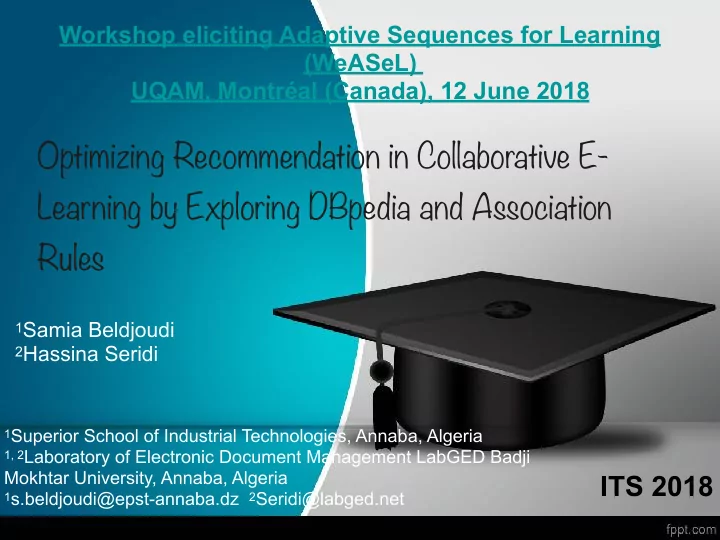

Workshop eliciting Adaptive Sequences for Learning (WeASeL) UQAM, Montréal (Canada), 12 June 2018 Optimizing Recommendation in Collaborative E- Learning by Exploring DBpedia and Association Rules 1 Samia Beldjoudi 2 Hassina Seridi 1 Superior School of Industrial Technologies, Annaba, Algeria 1, 2 Laboratory of Electronic Document Management LabGED Badji Mokhtar University, Annaba, Algeria ITS 2018 1 s.beldjoudi@epst-annaba.dz 2 Seridi@labged.net
Work plan Conclusion Experiment Contribution Motivations General Context � 2
General Context: Social Web Is a set of social relations that link people through the World Wide Web � 3
General Context: Collaborative E-learning � 4
General Context: Folksonomies Indexing systems produced within internet communities � 5
General Context: Recommendation and Collaborative E-learning suggest items: movies, music or products by analyzing what the users with similar tastes have chosen in the past � 6
Issues in Folksonomies • Tag ambiguity (Polysemy: many sense): Apple � 7
Example � 8
Recommender system issue: Diversity and Novelty • Accuracy vs Diversity and Novelty in Recommendation: � 9
Linked Open Data (LOD) Public & Linked Open Linked data under an open Data license. � 10
Research Question How using LOD to improve recommendation when searching personalized and relevant resources within social E-learning applications? � 11
Main Contributions Contribution Using LOD to Reduce tag ensure diversity ambiguity problem and novelty in in recommendation recommendation � 12
Approach description o Formally: a folksonomy is a tuple F = <L, T, R, A> L : learners T : tags R : resources A : the relationships between the three preceding elements, i.e. A ⊆ U x T x R � 13
Approach description ➔ Extacting 3 Social networks: ✓ network relating tags and users, ✓ network relating tags and resources ✓ network relating users and resources. ➔ We represent these social networks by three matrices LT, RT, RL: o LT = [X ij ] where : X ij o RT = [Y ij ] where: Y ij o RL = [Z ij ] where: Z ij � 14
Association Rules � 15
Associations Rules and Folksonomies Transaction-id ➔ Learner Transaction items ➔ tags used by the learner Learner (transaction-id) Tags (itemsets) L1 Software,…………………………., Java L2 Software, ………………………… L3 Java, ……………………….,Software L4 ……………..,Java L5 Java,……………………………,Software Software ⇒ Java � 16
the resou probl rces ems � 17 tagge of tag d with ambig each • (3) uity: tag • We calcul found test ate in the wheth simila conse er the • (2) rities quent tags betwe of the which en rule are in learn are the ers. candi • (1) antec date edent to be of the reco rule mme are nded used by the Steps by the syste curre m. nt learn
Example Computer R1 Mac R2 Sun Java Informatics R3 � 18
Example Sun T1 T2 T3 … … Tn L1 L2 L1 L2 … L10 L11 L12 Lm R1 L10 R2 L11 R3 L12 Lm L1 L2 … L10 L11 L12 Lm R1 R2 R3 R1 T1 T2 T3 … … Tn L1 L2 L10 L12 � 19
Diversity in Recommendation Recommendation User profile R e c o m m e n d a t i o n � 20
LOD exploration to insure diversity and novelty Tagged R4 R3 R1 R2 LOD exploration Evaluation Recommendation � 21
Del.icio.us database 1712 tag assignment s computer ⇒ programming: 120 association 60% of the rules (support= users using the 0.5 and 744 150 users tag ''computer'' resources confidence = also use the tag 0.6. ''programming''. 543 tags � 22
Evaluation Methodology Repeat this We randomly Select a set of process five removed sets of tags containing times for each resources tagged ambiguous tags: tag in order to by these (114 tags) make a cross- ambiguous tags. validation. � 23
Experimental Results Precision Recall F1 Diversity Novelty 0.78 0.71 0.74 0.76 1.2 • Deviation value: Precision Recall F1 Diversity Novelty 0.15 0.09 0.1 0.2 0.34 The averages are very promising for the community in general ➔ the small values of standard deviations indicate that the metrics are also promising for each user individually. � 24
Conclusion � 25
Future work • Ant Colony Optimization (ACO) Algorithm • Event detection � 26
Thanks… s.beldjoudi@epst-annaba.dz � 27
Recommend
More recommend